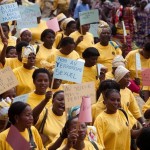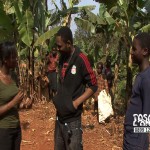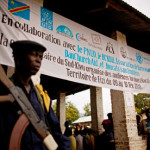Focus on DRC: Tosalel’ango Impact
Earlier today we spoke about Tosalel’ango (Let’s Do It!), a reality TV program in the DRC that tackles issues suggested by young people. This post explores the impact of the show.
Recently, Mike Jobbins (SFCG’s Africa Program Manager) talked with Gedeon Engwanda, the Congolese Director of Tosalel’ango about the impact the reality TV show is having on DRC audiences. Mr. Engwanda talked specifically about the episodes covering the orphans of Kaniola, women’s inheritance rights, and girls in Lubumbashi who were victims of sexual abuse at school.
Talking about the response to the show focused on the children born of rape in Kaniola, Mr. Engwanda said,
People could not stop calling. They were stunned, and shocked. This sort of story is never shown on Congolese TV. When it aired, our studio phone line received 300 SMS text messages. People were so moved, but also confused because this story [featuring the perspectives of the rejected orphans] is so different and unusual. We received calls from other groups needed help, and we gave them what advice we could. Afterwards Werra Son [The Congolese superstar musical group] was doing a concert in Bukavu and they went to visit the same orphanage and bring their support. They did not say that they were doing this because they saw our program, but how else would the biggest musical group in Congo be in the small village of Kaniola, to bring help to orphans who were accused of being the children of rebels and rapists? In this way, the episode has really attracted a lot of attention to the topic.
For Mr. Engwanda, the response to the episode dealing with women’s inheritance rights was the most amazing:
The one that impressed me the most was another show that we did, focused on an orphan who was stripped of her belongings and left homeless when her father died, because his brother’s family took the land and said she had no right to inherit [traditionally women's inheritance rights are often abused in the DRC]. She went on the show, and we took her to see a judge who is expert in family law, and who counseled her on the law and what legal proceedings she should use to get the land back. After the program went on air, we received many calls from people. In two cases, young people came to see us who were in the same situation and who wanted legal counseling. We are not experts, and so we introduced them to the judge who had counseled the first girl. He is advising them now on what steps they must file to do a legal complaint. If we had additional funds, in the future we would love to now show these people who followed up on the things they saw on TV, and tried to copy it in their own lives. In that way, it would encourage more people who watched copy the second group of people, and so forth, to build a movement of young people who are engaged.
The episode that dealt with sexual abuse in Lubumbashi schools gave girls an opportunity to talk about their experience, even beyond the public spotlight of the show:
For the case of the high school girls in Lubumbashi, after the show stopped filming, the girls who were willing to denounce in public met in private with some of the other girls who were in the same situation, but would not want to be on camera. They sat down with the representative of the Child and Women’s Protection Brigade of the Police, and then with the Policewoman who is the Commander of the Brigade. The Commander met with all of the girls, and with their parents. They agreed to assemble four different cases against specific teachers for sexual harassment and other crimes. I spoke with the Commander two or three weeks ago, to see how the case was developing. She told me that they had begun to assemble the cases against the professors, and they had completed the charging documents, and so the cases should be beginning soon. The program is not scheduled to go on air until January, but we expect the effect will be huge.
Tosalel’ango has touched a nerve with audiences in the DRC. Mr. Engwanda says he is “overwhelmed” with the feedback:
Our telephone line does not stop. It starts at 5 AM each morning, and it rings every five minutes, from the morning to the night every single day of the week. We do our best to answer, but we are overwhelmed with feedback. In the morning we get calls from young people and kids, but the calls in the evening are often from adults, and even important people, who have been watching the show pass on their television and decide that they would like to call to tell us what they think.









